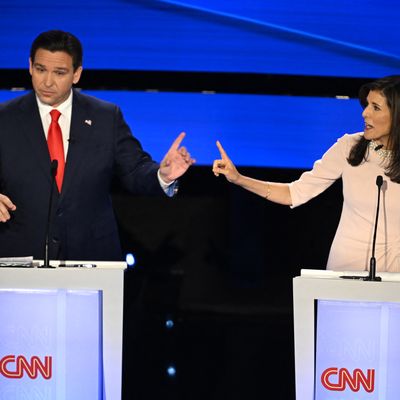
It’s rare when a debate can make or break presidential candidacies. But CNN’s one-on-one encounter in Iowa between Ron DeSantis and Nikki Haley was between two White House aspirants fighting for survival, and it showed. It took them just a few minutes to call each other liars, and throughout the debate they struggled to maintain balance between promoting their own message and savaging each other.
They certainly didn’t call their absent foe, the regularly mendacious Donald Trump, a liar. But the overwhelming front-runner in the race didn’t evade criticism. Haley more bluntly than before criticized the former president’s description of January 6 as “a beautiful day,” though DeSantis pivoted quickly from Trump’s contempt for the Constitution to his own plans for vengeance against those who planned COVID lockdowns. For the most part, though, they stuck to a few familiar comparisons of themselves to Trump. DeSantis accused him of failing to deliver on some of his most right-wing promises and fuzzing up his position on abortion. Haley suggested he fell short on spending and China policy and ought to defend his record in debates (perhaps an overture to a direct debate challenge if Haley becomes Trump’s last challenger). DeSantis also warned that Trump’s legal peril would make a Republican victory against Joe Biden less likely if he’s the nominee, and Haley as always talked about the “chaos” surrounding the former president.
But their attacks on each other were more abundant than any we’ve seen coming from a Republican candidate not named Vivek Ramaswamy. DeSantis took an ideological tack against Haley, at one point saying she might be “more liberal than Gavin Newsom,” and accused her of “virtue-signaling to the left” for expressing sympathy over the murder of George Floyd. He blasted her again and again for her failure to get school-voucher programs enacted in South Carolina (perhaps a nod to Iowa’s powerful home-school movement); suggested she is snuggly with globalists (“You can take the ambassador out of the United Nations, but you can’t take the United Nations out of the ambassador” was one of his better lines); and regularly accused her of doing the bidding of wealthy donors who love China. He also managed to draw Haley into a discussion of Social Security that underlined her willingness to cut benefits once current beneficiaries are protected.
Haley must have mentioned her campaign’s website desantislies.com 20 or 30 times, where you will learn that “the more Ron DeSantis loses, the more he lies.” She appears to have decided his patent desperation is a point of vulnerability; she also repeatedly brought up his campaign’s many organizational problems and heavy spending, asking: “If you can’t manage a campaign, how can you manage the country?” And she reciprocated DeSantis’s criticism of her as an opportunist, suggesting he changed his policies in Florida on a host of issues after deciding to run for president, particularly on renewable-fuel policies that are extremely popular in Iowa, where ethanol fuel is made out of corn. Perhaps her most direct attack on DeSantis was her description of his culture-war conflict with Disney as “bullying businesses.” Oddly, she didn’t mention her electability advantage over DeSantis in general-election polls against Biden.
At multiple points in the debate the two candidates seemed to be dueling public-relations agents for their own states, with DeSantis slagging South Carolina’s bad schools and Haley describing Florida as too expensive for seniors.
To be clear, the candidates agreed on a lot of reactionary themes. They both made it crystal clear they wanted to deport every single undocumented immigrant in America. They both refused to differ with Israeli politicians calling for deportation of Palestinians from Gaza. They both favored replacing Medicaid as we know it with state-controlled health-insurance programs. And both called for law-and-order policies aimed at allegedly permissive cities.
Who won? Supporters of each candidate probably heard what they wanted to hear, but DeSantis kept his cool a bit better (if he doesn’t beat Haley in Iowa he’s probably done, while she can move on to a promising situation in New Hampshire), and had the superior zingers. Haley’s incessant references to desantislies.com were increasingly annoying, though I am also puzzled by DeSantis’s belief in the power of the description of Haley’s politics as “the pale pastels of warmed-over corporatism,” which he repeated three times. Maybe he wrote that one himself.
In the end the fight between these two pols will likely come down to whether DeSantis’s vaunted Iowa organization still has enough strength to turn out his supporters on a very cold caucus night, despite his steadily eroding decline in polls. Haley got some great news hours before the debate when Chris Christie (not a serious candidate in Iowa, but one who was running a respectable third in New Hampshire) folded his campaign. This was not, however, one of her better debate performances. Her campaign will be in white-knuckle mode until Monday, and to paraphrase Christie’s hot-mic comment, Trump’s going to smoke both of them in Iowa anyway.






























